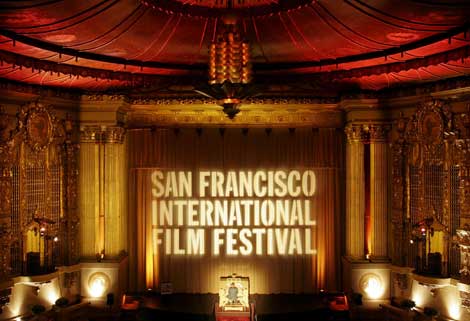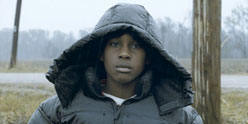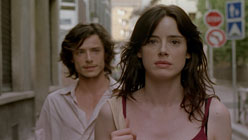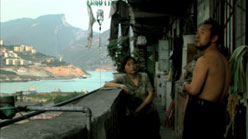
The 51st San Francisco International Film Festival opens Thursday night and runs for two weeks. It's a strong lineup this year, but just six weeks ago I was still a little uncertain.
On March 10 the Film Society announced the name of the film that would be the "centerpiece" of this year's festival and injected a little worry into the pit of my stomach, a sheep shank in my galley, you might say, especially if you're a fake seaman. In a city that prides itself on varied and voluminous film screenings all year long, the SFIFF is still the flagship. It's a large festival — the first on this continent, actually — and although it suffered a bout of acute melancholia at the turn of the century, it seems to have been set aright by festival director Graham Leggat. It's the standard bearer for the city's culture of cinema. San Franciscans who care about movies guard it jealously.
Which is all the more reason for a local cinephile to worry that the festival will somehow compromise its programming whenever the economy hits rough waters, perhaps by resorting to big, dumb Hollywood movies in a desperate need to sell tickets.
A Word About Centerpieces
It used to be that a sizable film festival would celebrate its opening and closing films with pomp and circumstance, red carpets and spotlights, cocktail parties and natty attire, the sort of pageantry that lends the festival its event status and serves to buoy the quieter films that occupy theaters in the intervening days.
'Tis a pity that a given year's festival can only open and close once, thought a festival director somewhere on earth. Shook his head. Studied the calendar. Light bulb! By Jove, let's stick another opening in the middle! Or closing! What have you. Thus, his dream of a third buoy was born: the "film festival centerpiece," a red carpet event perched in the middle of the proceedings like a shellacked cornucopia, a construction paper pilgrim hat, a papier mâché turkey.
The New York Film Festival has one. Los Angeles. Miami. And for the last few years, San Francisco. It's a good idea, actually. It doesn't mean much to me, but I get it.
This year's centerpiece is a film that premiered at Sundance called The Wackness, a teen movie that seemed to be a crowd pleaser even though I panned it while blogging from Park City for Paste. (It's almost as if people were not heeding my every word.)
It's a hip, silly, kinda dull — I know, right? — comedy that won't experience much friction on its way to America's theaters, the sort of film that needs no red carpet, little pomp, and nary a circumstance. Sony tentatively plans to open it over the July 4 holiday weekend.
Here I cut to the chase: my worry was unfounded. The Wackness is indeed nothing to write home about, but it's one of only two films — in a festival of hundreds — that could possibly be called multiplex-bound Hollywood movies, a designation that doesn't even apply to the festival's opening and closing films. (The other somewhat high-profile film is David Mamet's goofy but provocative Redbelt, also to be distributed by Sony Pictures Classics. But even that isn't a likely blockbuster.) A number of the festival's films have secured limited distribution, but others haven't, and unlike many festivals of its kind, the San Francisco festival doesn't reserve a large segment of its calendar for premiering big films that will be opening wide in the coming weeks. This festival spends that time screening smaller, more interesting movies that you likely won't have many opportunities to see on the big screen again.
It should be a rewarding couple of weeks.
The Plan: No Screeners
Of the festival films that I expect to see, I can only comment on about a third of them today. Here's why: I've decided not to watch any of them at home on video. When a festival is approaching, the publicity office generates buzz by screening some of the key films for press and by making many others available to journalists and critics in the form of DVD screeners.
This is convenient for people who need to see a bunch of the movies ahead of time and write about them for, say, the local paper. But DVD screeners are a lousy way to watch movies, believe me, especially movies that in a few days will be shown on big screens to packed houses.
So this year I'm shunning the screener experience (with one exception, a video I'd already watched when I made this decision).
But don't worry, my gain is your loss! It's a win-win.
Instead, here's the plan: right now I will tell you what I think of the one-third that I've already seen, and I'll highlight the others that I'm eager to catch by telling you why I want to see them in the worst way. Then, perhaps we'll watch them together. As the festival rolls on, I'll post small updates as I see more flicks. And, seriously, don't be like those Sundancers who went around talking about The Wackness and looked like absolute fools to anyone who'd been following my coverage. Read about the films below. Take heed. Take notes. Take both heed and notes if you can do so without accident.
The Films I've Seen
The festival is screening several of my favorite recent discoveries, including three films from veterans, one outstanding debut, a tour de force from a filmmaker I'm just learning about, and a short experimental diary. I like these six films enough that I will probably see most of them again.
Links to my previous comments, if any, are in brackets.
Six Personal Favorites (alphabetical order)






• With Ballast, Lance Hammer makes one of the most striking debuts in recent years by applying the style and techniques of Jean-Pierre and Luc Dardenne to a community in rural Mississippi. Things haven't gone smoothly for his characters — a boy, his mother, the man next door — but Hammer still believes in their ability to prevail. [podcast, blog]
• It's a nearly wordless shaggy dog story, but In the City of Sylvia is also an exhilarating verse on dreams and memories, an ode to painting and cinema, and a celebration of the city of Strasbourg and the women who walk its streets. It's being presented by J. Hoberman, ace film critic from the The Village Voice, in conversation with Kent Jones. [podcast]
• I'm generally on the fence about Catherine Breillat, but her latest film, The Last Mistress, is pretty good, not least because Asia Argento stars. (She's everywhere. In this festival alone, she's in three films.) It's a period piece in which a man tries to possess a woman, or is it the other way around? Someday in repertory world it would make a fine double feature with In the City of Sylvia, but for now the festival has given each film its own event, which sounds right to me. The Last Mistress is the festival's opening night film.
• Béla Tarr doesn't make double-feature material. His films stand alone, and, typical among them, The Man From London is mysteriously captivating for purely visual reasons. What he does is a trick of hypnosis, accomplished through deep shadows and long, quiet takes. Through sounds, too, the stillness, the lapping of water against the bows of boats. My first time through, I don't think I caught much of the plot — a case of money, some men in fedoras, a post-synched Tilda Swinton — because I was too enthralled by the hovering platforms to notice much else. I suspect that when I see it again, the story will elude me once more. [podcast]
• Robert Beavers was born in America, but he's lived and worked in Europe for the last few decades and hasn't shot a film in the US since 1966. Until now. He recently traveled to his mother's cottage in Massachusetts and filmed the stillness, observed the contrast between the house's dark interior and the bright but ever changing exterior, and considered his mother's age and his own memory. Pitcher of Colored Light is a peaceful meditation in 24 minutes, presented at the end of a program of short films.
• The massive Three Gorges Dam project in China has attracted filmmakers who are intrigued by the mass relocation of residents and others who are attracted by the spectacle. Jia Zhangke is clearly interested in both. I saw the provocatively titled Still Life a year and a half ago in Toronto and have been hoping for a chance to see this beautiful, slow film again. It's one of the most gorgeous features I've seen shot on high-definition video which bodes well for the future of cinema. See below for another film about this subject, Up the Yangtze.
Decent Films (in preference order)
I don't like these as much as the six above, but I'm glad I saw them, for different reasons. The ones I enjoyed most are at the top, and the one at the bottom, American Teen, has been gradually dropping since I saw it in January.
- Alexandra — Alexander Sokurov made one of my favorite films of 2005, The Sun, and while I didn't like this story of a grandmother in a war zone quite as much, it's a thought-provoking way to look at Russia. Sokurov, you know, is the guy who made Russian Ark.
- Gonzo: The Life and Work of Dr. Hunter S. Thompson — This profile of Thompson is certainly a good time. With archival footage, interviews, and reenactments, it touches upon the man's political reportage and has a great sequence about his absurd campaign for the mayorship of Aspen, but it doesn't plunge too heavily into politics. Director Alex Gibney recently won an Oscar for his excellent Taxi to the Dark Side, and he also made the documentary about Enron. Gonzo is lighter than both of them, but it's just as passionate. It's narrated by Johnny Depp, naturally, and it's the festival's closing night film.
- Shampoo — The Hal Ashby classic with Warren Beatty is screening after an onstage interview with screenwriter Robert Towne.
- Redbelt — The trailer for David Mamet's newest movie makes it look like a bare-knuckle sport film, but it feels more like House of Games than anything he's done since 1987. Still, it has its goofy moments, and by the end I know what the hero stands for but I'm not sure what he's done to be rewarded so handsomely. Let me think about it.
- Up the Yangtze — This straightforward documentary about the aforementioned Gorges Three may be a better introduction to the project than Still Life, but it's not nearly as poetic. Focusing on two young people who work on a boat that shuttles pampered tourists up and down the river, it's a moving and insightful look at how the damn dam is affecting different classes of people. However, as in most documentaries of this type, the camera likely has a big effect on the people and situations that it shows us, but the effect is never acknowledged.
- Secrecy — I liked The Same River Twice, Robb Moss's documentary about how he and his bohemian friends have changed over the decades, but for this film he steers into Errol Morris territory — with animated filler and a score reminiscent of Caleb Sampson — to examine the government's penchant for secrecy. It's a fascinating topic, but I'd have preferred a more coherent argument.
- Standard Operating Procedure — Errol Morris himself has a new film, and it's troubling for some of the wrong reasons. That'll take time to explain, so we'll do so on the podcast. Morris will be onstage for an interview, and perhaps he will convince me why I'm wrong about his film.
- Medicine for Melancholy — The one festival film that I saw on a DVD screener instead of in a theater is one of the more attractively shot video features I've seen recently. The muted color palette, achieved through filters in post-production, I imagine, is easy on the eyes and may even dovetail with the film's themes. In a story that recalls Before Sunrise and Joe Swanberg's so-called mumblecore films, an African-American man and woman have a one-night stand and spend the following day wandering San Francisco and chatting, specifically about the city's dwindling black population. It's a smart, socially aware film, nicely acted, but the expository dialogue makes it feel like the first feature that it is. Minimalism requires a knack for hiding ideas inside sparse scenes — think of Old Joy — but Medicine for Melancholy's conversations are a little too rich, while its around-town sequences seem impoverished.
- Flow: For the Love of Water — It's another topic that I can't get out of my head: water issues. Specifically the transformation of what was once a basic right in many places into a commodity for sale by private enterprises. And, seriously, why are we shipping water from Fiji and carrying it around in containers made of petroleum? Among the questions asked by the filmmakers: where do water sellers get their water? As with Secrecy, I crave a documentary that examines this system, but I wish these filmmakers had presented a more coherent argument instead of a series of isolated, albeit interesting, water-related developments around the globe.
- Brick Lane — A Bengali woman marries and moves to London in a film that recalls Mira Nair's recent film The Namesake but without the depth of character.
- Go Go Tales — Without the context of the filmmaker's career, I'm not sure Abel Ferrara's comedy about an old-style Times Square strip club would have much to offer, but since it springs from the lore of Ferrara, it's an inspired look at himself and his life. Willem Dafoe has fun as Ferrara's alter ego, but if you've bought a ticket because you heard Asia Argento has a scene with a rottweiler, you'll likely be disappointed. [podcast]
- American Teen — A light, enjoyable fiction about an Indiana high school, American Teen is just a half-notch above reality TV. I take that back: R. J. Cutler probably did it better eight years ago on the little screen, when it was called American High and ran on PBS. This film is presented as a documentary, but it's not clear how we overhear all the important phone calls, see all the pivotal text messages, and attend so many dramatic events. As a (narrow) slice of teenage life, it has all the tears and laughter that make for a rousing conclusion, but it's been slipping in my estimation since Sundance (not that I was overjoyed even then).
No, Thanks (alphabetical)
- I Served the King of England — I'll need an entire essay to explain why I despise this film. Perhaps it's the idiot of a hero, or his political naiveté — make that political deafness — his political deafness in regard to Nazis, or the film's political deafness, or the way the hero's dumping of property stolen from Jews is made to appear enlightened (see, he's finally letting go of those stolen riches, bravo!), or the way he never meets a woman who doesn't love to be ogled, or the way the film riffs on Chaplin in ways that almost seem designed to strip his themes of their political and social commentary. (And some people say that Chaplin's politics are naive. My God.) Yes, I understand that it's a black comedy. I have no problems laughing at Nazis. Har har. I have a problem with a dumb movie seeking Black Comedy protection. Wait, the führer does make our hero lose his woody a couple of times, so there's that. Also, pretty Czech girls are often topless. Otherwise: complete garbage in a package cute enough to make Amélie vomit into her fist.
- The Wackness — I don't like this movie, but it's not a mystery to me why some people do. Every five minutes there's a forced reference to 1990s pop culture. Ben Kingsley acts like a stoned teenager and very, very briefly makes out with Mary-Kate Olsen. Also, the teen actors — Olivia Thirlby and Josh Peck — are popular, and one of them is more than a little likable. That sort of thing. Not my bag, although Kingsley did get two chuckles from me: 1) the hair, and 2) the graffiti. [blog]
Now, Films I Plan to See
I'm going to watch my faves from above, attend the interviews with Errol Morris, J. Hoberman, and Robert Towne, and also try to catch most of the following:Because of the Filmmaker
- The Romance of Astrea and Celedon — Eric Rohmer
- A Girl Cut in Two — Claude Chabrol, plus Ludivine Sangier
- My Winnipeg — Guy Maddin, who concluded our conversation last year by saying he hoped his next film would "jumpstart Winnipeg tourism." Here it is.
Because of a Recommendation from the Friendly Ether
Every morning I inhale thrice from a vial. Here's what it tells me.
- You, the Living
- Latent Argentina
- Profit motive and the whispering wind
- La France
- Mutum
- The Secret of the Grain
- All is Forgiven
Because of the Subject
- Forbidden Lie$ — it's about a memoir fabricator
- Dust — it's about dust
- The Judge and the General — it's about Pinochet prosecutor Juan Guzmán
- Stranded: I've come from a plane that crashed on the mountains
- Faubourg Tremé: The Untold Story of Black New Orleans
Because I'm Curious
I'm curious to know more about these filmmakers or these particular films. It includes some obvious giants that I'm relatively ignorant of and some films that I've heard about without getting a strong reaction from anyone, yet.- Shorts: Alternate Geographies — includes a 10-minute film by Bruce Conner
- Leave Her to Heaven — classic by John M. Stahl
- Mongol &mdash Oscar nominee for foreign film, from Kazakhstan
- Frozen — those eyes from the festival trailer
- Sleep Dealer — a Sundance film that I missed
- Mock Up on Mu — Craig Baldwin on California
- Shadows in the Palace — the only South Korean film this year
Maybe, Just Maybe
If I find that I have time to work one of these into the day, I might give it a shot, but i don't feel strongly about any of them. That isn't to say they aren't good. It just means I don't know.- 10 + 4 — a followup to Kiarostami's Ten by the star
- Barcelona (A Map)
- Shorts: Picking Up the Pieces — includes a 3-minute short by Lars von Trier. Also, do not confuse this 25-minute Alexandra with the feature of the same name, and don't confuse Shelf Life with Still Life. Tricky!
- Glass: A Portrait of Philip in Twelve Parts — don't confuse this with Glasses. Or, if you do, please tell me how it is so I can catch it if necessary.
- The Yellow Handkerchief — Maria Bello stars and converses
- Recycle — a documentary from Jordon with a neat look
See you around.
Rob: I've been anticipating this post. It helps mollify the sting I felt at yesterday's press screening when I enthused over The Wackness and your eyes went all black and snapping. Who needs J-horror when you can just have a disagreement with Rob Davis? I had to go home and self-medicate to calm down.
This is an informed entry that I'm going to go right back through once again to compare notes. It appears we'll be seeing many of the same films so you'll have more than one opportunity to whittle me down to size for enjoying things I have no critical discernment about.
I will say this: when I sit down to write about The Wackness, you can be sure I'll be looking over my shoulder, fully expecting you come come creeping around the corner, disjointed, with dark snapping eyes.
My immediate question on the second readthrough is why will I be disappointed in Asia's rotweiller kiss? Is the rotweiller not handsome enough?
And dude, the "complete garbage in a package cute enough to make Amélie vomit into her fist" summarization made me laugh so loud that I've set off the car alarms of parked cars, gotten the neighborhood pack of dogs to start howling, and have no doubt woken the neighbors.
It's a lovely day in the neighborhood.
Wow, I got two read-throughs. Cool.
Sometimes, you know, I dislike a movie that I can't imagine someone else liking, and it just highlights a gulf between me and people who do. But I don't feel that way about The Wackness at all. I see why you and many other people like it, and actually I probably sound more harsh than I really am. My eyes didn't really go black and snapping over something so innocuous, did they? I remember that I liked it more than two or three other films at Sundance that I really did feel that way about.
I was vague about Asia's scene; you're right. As we've seen lately, she can make a movie, but she has a very small part in Go Go Tales, so my warning is that if she's your only reason to attend, the film might feel like a slog. I don't often dip into the "if you X, then you might think Y" brand of criticism, 'cause I'm not very good at it, you'll notice.
BTW, my joke about the "absolute fools" who disregarded my opinions on The Wackness was written before we talked about the film yesterday, so it wasn't aimed at you (or anyone but me, actually). Hope you didn't take it that way.
Brian Darr has a great index of links about the festival, as do Michael Guillen and Michael Hawley -- along with their own reactions to many of the films -- at The Evening Class.
Karina Longworth takes down The Wackness which is also playing at Tribeca.
